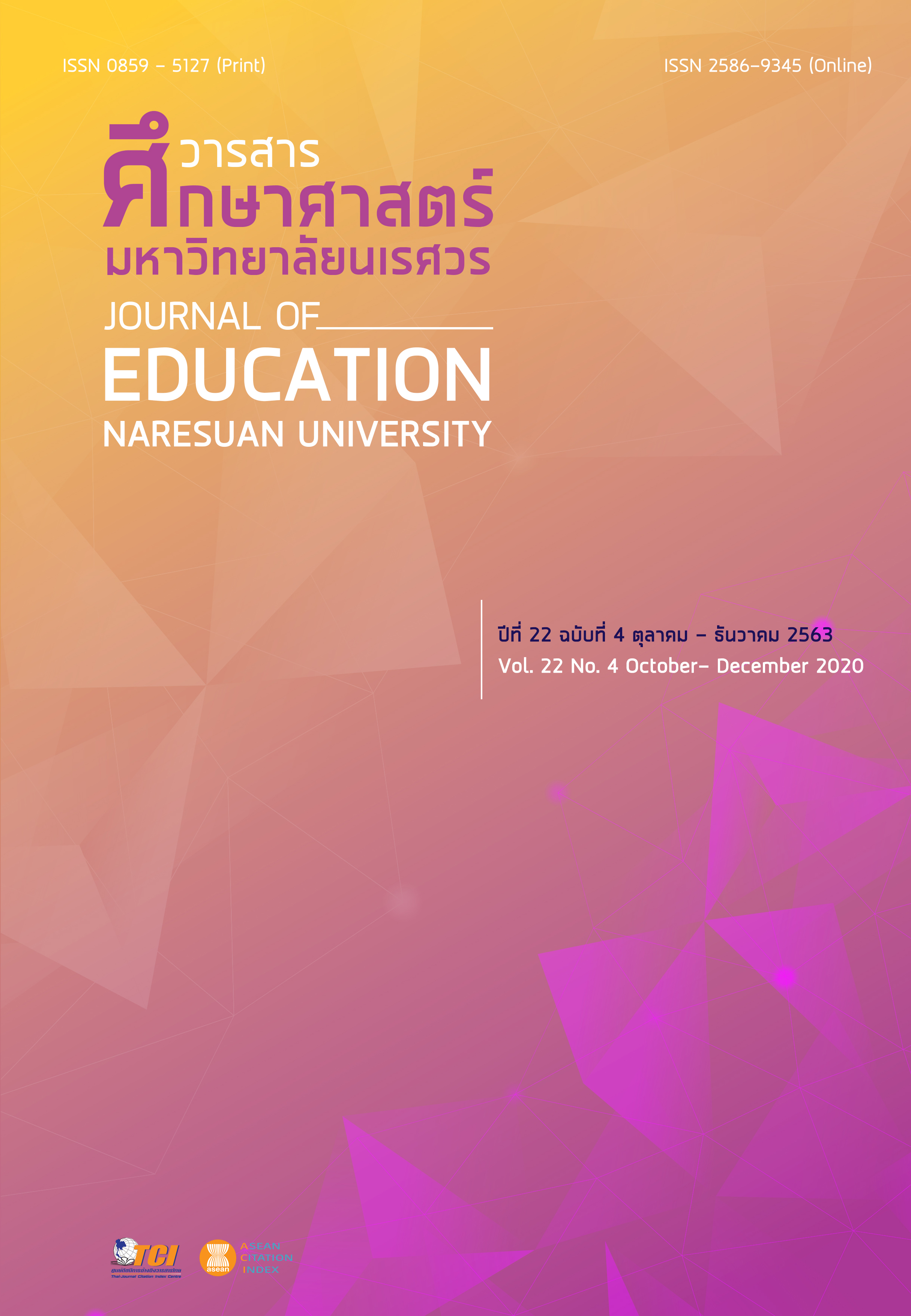THE DEVELOPMENT OF CREATIVE PROBLEM SOLVING COMPETENCY ON THE APPLICATION OF LINEAR EQUATION FOR ONE VARIABLE TOPIC ON MATHEMATISING PROCESS OF 7th GRADE STUDENTS การพัฒนาความสามารถในการแก้ปัญหาอย่างสร้างสรรค์ เรื่อง การประยุกต์สมการเชิงเส้นตัวแปรเดียวด้วยกระบวนการคิดให้เป็นคณิตศาสตร์ สำหรับนักเรียนชั้นมัธยมศึกษาปีที่ 1
Main Article Content
Abstract
This research aimed to study the effects of using mathematising process on the topic of application of linear equation for one variable to enhance creative problem solving competency of 7th grade students. The number of participants were 44 students of Saluang Pittayakom School, Phichit Province. The instruments used in the research were three lesson plans based on mathematising process on the topic of application of linear equation for one variable, activity sheets, and creative problem solving ability test. Data were analyzed by content analysis and data creditability by triangulation method. The results revealed that most of students were in good level of creative problem solving ability. Namely, students could show fact finding skills in very good level (68.18%), could show problem finding skills in good level (54.55%), could show problem Idea skills in good (50.00%), could show solution finding skills in good (43.18%), and can show creating new knowledge skills in good level (59.09%).
Article Details
The owner of the article does not copy or violate any of its copyright. If any copyright infringement occurs or prosecution, in any case, the Editorial Board is not involved in all the rights to the owner of the article to be performed.
References
Benjaboonyazit, T., Wiwattanadate, P., & Tungteerasunan, P. (2007). The development of creative thinking by TRIZ (Theory of Inventive Problem Solving). Bangkok: Technology Promotion Association (Thailand-Japan). [in Thai]
Clemets, M. A., & Ellerton, N. F. (1996). The Newman procedure for analyzing errors on written mathematics. Retrieved August 28, 2018, from http://www.compasstech.com.au/ARNOLD/PAGES/newman.htm
Dachakupt, P., & Yindeesuk, P. (2014). Learning management in the 21st century. Bangkok: Chulalongkorn University Press. [in Thai]
Institute for the Promotion of Teaching Science and Technology (IPST). (2011). PISA 2009 results: reading, mathematics and science. Bangkok: Aroonkranpim. [in Thai]
Institute for the Promotion of Teaching Science and Technology (IPST). (2012). Mathematical skills and processes (3rd ed.). Bangkok: 3Q Media. [in Thai]
Institute for the Promotion of Teaching Science and Technology (IPST). (2014). PISA 2012 results: reading, mathematics and science - What do students know and do? Bangkok: Aroonkranpim. [in Thai]
Isrok’atun, & Tiurlina. (2014). Enhancing students’ mathematical creative problem solving ability through situation-based learning. Mathematical Theory and Modeling, 4(11), 44-49.
Kennedy, L. M., & Tipps, S. (1994). Guiding children’s learning of mathematics international (5th ed). Belmont, California: Wads Worth.
Ministry of Education. (2009). Indicators and learning area of mathematics of the basic education core curriculum A.D. 2008. Bangkok: The Agricultural Cooperative Federation of Thailand. [in Thai]
Noipinit, P. (2017). An action research on developing instruction on conic sections topic through design thinking process to enhance creative problem solving ability of 10th grade students (Master’s Thesis). Naresuan University, Phitsanulok. [in Thai]
Office of the Basic Education Commission (OBEC). (2011). Strengthening "life skills" according to the focus of quality development for primary-secondary learners. Bangkok: Thailand Agricultural Cooperative Assembly Printing Press. [in Thai]
Organization for Economic Cooperation and Development (OECD). (2009). PISA 2009 assessment framework – key competencies in reading, mathematics and science. Retrieved February 23, 2018, from: https://www.oecd.org/pisa/pisaproducts/44455820.pdf
Ramsiri, R. (2013). The development of science instructional model by using research-based to enhance research skills, creative problem-solving skills and scientific minds of secondary school students (Doctoral Dissertation). Retrieved from http://www.thapra.lib.su.ac.th/thesis/showthesis_th.asp?id=0000009829 [in Thai]


